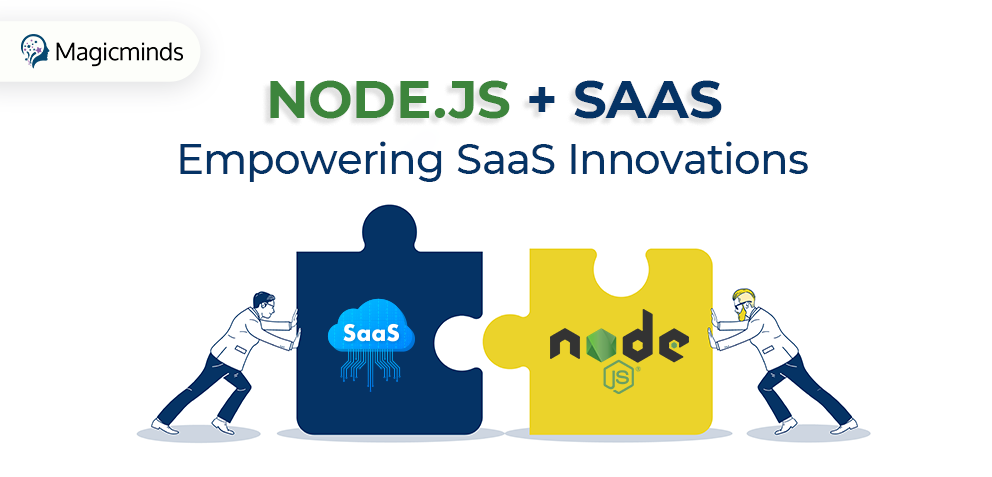6 Reasons Why Node.js is Powering Up SaaS Development

Tags
 Stay In-the-loop
Stay In-the-loop
Get fresh tech & marketing insights delivered right to your inbox.
Share this Article
Category
- .Net Developer
- Adtech
- Android App Development
- API
- App Store
- Artificial Intelligence
- Blockchain Development
- Chatbot Development
- CMS Development
- Cybersecurity
- Data Security
- Dedicated Developers
- Digital Marketing
- Ecommerce Development
- Edtech
- Fintech
- Flutter app development
- Full Stack Development
- Healthcare Tech
- Hybrid App Development
- iOS App Development
- IT Project Management
- JavaScript development
- Laravel Development
- Magento Development
- MEAN Stack Developer
- MERN Stack Developer
- Mobile App
- Mobile App Development
- Nodejs Development
- Progressive Web Application
- python development
- QA and testing
- Quality Engineering
- React Native
- SaaS
- SEO
- Shopify Development
- Software Development
- Software Outsourcing
- Staff Augmentation
- UI/UX Development
- Web analytics tools
- Wordpress Development
SaaS (Software-as-a-Service) is a game-changer in software, offering on-demand access to applications and services. The worldwide SaaS market will expand from $273.55 billion in 2023 to $908.21 billion by 2030, driven by its cost-efficiency, scalability, and accessibility. The choice of technology stack in SaaS development significantly influences the software’s performance, speed, and features.

Enter Node.js – a game-changer in SaaS development.
Imagine a technology that seamlessly handles real-time collaboration, scales effortlessly, and enhances user experiences. Node.js is that vital element, a versatile server-side runtime environment for JavaScript, and it’s rapidly becoming a linchpin in the world of SaaS.
In this article, we explore six reasons why Node.js is leading the way in SaaS development, reshaping the future of cloud-based software.
Reasons Why Node.js Rules SaaS Development
- Reason 1: Scalability and Performance
- Reason 2: Speed and Efficiency
- Reason 3: Easy Learning Curve
- Reason 4: Rich Ecosystem
- Reason 5: Real-time Applications
- Reason 6: Cross-Functionality
How NodeJS Development Empowered Top Global SaaS Platforms– Use Case Examples
- Real-Time Collaboration Tools– Slack
- Social Media Management Platforms – Hootsuite
- Data Streaming and Processing – Netflix
- Serverless Computing – AWS Lambda
- eCommerce Marketplaces – eBay
Is NodeJS Development Suitable for Your SaaS Platform?
The Rise of SaaS Development
SaaS, or Software as a Service, is similar to renting software from the Internet. Instead of buying and installing it on your computer, you can use the software online through a web browser.
SaaS became popular as it is convenient since one can access it anywhere and pay for only what is used. As more and more of us want software that’s easy to get, works on the Internet, and doesn’t cost too much, SaaS stepped up to provide an exciting solution.

Source: Researchgate
How we install software on our devices or local computers is needed to keep up with how fast things are moving in our connected world today. SaaS is flexible and works well for businesses of all sizes and types, and adjusts to the changing needs of our fast-paced world.
One big reason SaaS is booming is because we need software that can grow with us. As we collect more data and expect software to do a lot, it has to handle the extra work without slowing down. Old software-making methods can only sometimes do that, but SaaS can.
RELATED READ: Tech Trends 2023: The Big 5 in Software Development
Reasons Why Node.js Rules SaaS Development
Let us delve into the six-pack of powerful reasons why Node.js development is revolutionizing the creation of real-time, efficient, and robust SaaS solutions for businesses and users alike.
Reason 1: Scalability and Performance
Node.js excel in handling many users simultaneously. Thanks to its clever way of working with tasks in the background, it can manage many connections and jobs without slowing down, making it perfect for big and busy software.
Reason 2: Speed and Efficiency
Node.js uses an intelligent system that keeps things moving quickly. It’s designed to work with many tasks simultaneously to get started promptly. This makes software built with Node.js super fast and efficient.
Reason 3: Easy Learning Curve
Node.js is friendly to developers who already know JavaScript. Since JavaScript is widespread and lots of people already use it, Node.js is a good choice for many. It helps developers work faster and create excellent software.
Reason 4: Rich Ecosystem
Node.js comes with lots of extra tools. These are like helpful gadgets in a toolbox, ready for developers. They make it easy to create all sorts of features and functions in SaaS software.
Reason 5: Real-time Applications
Node.js is excellent for software that needs to work in real-time, like chat apps or live updates. It keeps everything moving quickly, so users get instant results. Imagine chatting with friends online without delays; Node.js makes that happen.
Reason 6: Cross-functionality
Node.js isn’t just for one part of the software; it can handle the behind-the-scenes (server-side) and the parts users see (client-side). This makes it perfect for developers who want to work on the whole package, from the server to what users click and see on their screens. It’s like having all the tools needed for full-stack development.
RELATED READ: 7 Leading App Development Frameworks for Future
How NodeJS Development Empowered Top Global SaaS Platforms– Use Case Examples
Real-Time Collaboration Tools– Slack
Slack is a popular platform that grew to be the ultimate chatroom for teams at work, making it super easy to talk and share files, keeping teams in sync, and getting tasks done together. Node.js was pivotal in developing Slack, the team collaboration and messaging platform.

Source: Slack.com
Slack requires a robust and efficient system to handle real-time messaging and updates for millions of users. Node.js’s asynchronous, non-blocking architecture made it an ideal choice. This allowed Slack to manage concurrent connections and deliver real-time communication seamlessly, contributing to its success as a reliable and scalable platform for team communication.
Node.js helped ensure that users could send and receive messages instantly, enhancing their overall experience with Slack.
Social Media Management Platforms – Hootsuite
Hootsuite is like an all-in-one tool for social media. It helps people and businesses manage and schedule their posts on social sites all in one place. It’s a time-saver with powerful insights for staying connected with your online followers.

Source: Hootsuite.com
Hootsuite needed a technology to handle real-time updates, content scheduling, and interactions across various social media channels. Node.js’s event-driven, non-blocking architecture enabled Hootsuite to manage these tasks efficiently, ensuring users could schedule posts and engage with their social media audience in real-time.
This made Hootsuite a robust and responsive platform for social media management, contributing to its success in the industry.
Data Streaming and Processing – Netflix
Netflix is currently a super popular streaming service where you can watch thousands of TV shows, movies, and original content.

Source: Beebom.com
With millions of users worldwide, Netflix needed to be capable of handling massive real-time data streams, ensuring smooth video streaming and content delivery. Node.js operates event-driven, which means it can efficiently manage multiple tasks simultaneously.
In Netflix’s context, this translates to the ability to process and distribute video content without waiting for one task to finish before starting another. It’s like a juggler who can simultaneously keep many balls in the air, ensuring that data processing and content delivery happen rapidly and without interruptions. This capability significantly reduces buffering times, ensuring users can stream their favorite shows and movies smoothly.
Serverless Computing – AWS Lambda
AWS Lambda is a service by Amazon Web Services that runs your code without dealing with servers. You write your code, and Lambda executes it in response to specific events, making it perfect for automating tasks and building applications, all without the hassle of managing servers.

Source: Medium.com
Node.js was crucial for developing AWS Lambda, Amazon’s serverless computing platform. AWS Lambda needed to handle various tasks quickly and efficiently in a serverless, event-driven environment. Node.js’s lightweight runtime and non-blocking I/O made it a natural choice.
AWS Lambda executes functions responding to events, like data changes or user actions, with low latency and high scalability. As a result, developers could build serverless applications that automatically scaled to meet demand.
eCommerce Marketplaces – eBay
eBay is one of the world’s largest online marketplaces, connecting buyers and sellers across the globe to trade a wide range of products, from rare collectibles to everyday items.

Source: ebay.com
The architecture of Node.js was pivotal in allowing eBay to handle a high volume of concurrent user interactions, such as real-time bidding and live product listings. This ensured a responsive user experience during high-traffic periods, enhancing customer satisfaction.
Additionally, Node.js’s efficient code execution helped reduce latency, making eBay a platform where users could easily shop, bid, and interact. Its ability to manage numerous connections at once and facilitate the development of real-time features contributed to eBay’s growth and its reputation as a dynamic e-commerce platform.
Is NodeJS Development Suitable for Your SaaS Platform?
If you are now thinking of Node.js development or simply to hire a Node.js developer to work on your platform, here are some considerations that can help you make the final decision!
- Real-Time Features: Node.js is excellent for platforms that require real-time capabilities, such as chat applications, live updates, or collaborative tools.
- Asynchronous Programming: If your platform needs to handle many users simultaneously, Node.js’s non-blocking architecture and event-driven model make it a good choice for scalable applications.
- JavaScript Proficiency: Node.js uses JavaScript on both the server and client side, making it ideal if your team is already familiar with the language.
- Efficiency: If you need high-speed data processing and low-latency responses, Node.js can be a good fit.
- Full-Stack Development: If you want to develop server-side and client-side components with a single technology, Node.js offers a full-stack solution.
- Specific Use Cases: Evaluate your platform’s unique requirements. It may be suitable if your platform’s core functionality aligns with Node.js’ strengths.
Final Words
SaaS development with Node.js has an undeniable impact in software development. Its scalability, efficiency, real-time capabilities, and versatile cross-functionality collectively make Node.js a go-to choice for building cutting-edge software solutions. As technology evolves and user expectations rise, Node.js remains at the forefront, ensuring that the SaaS industry thrives. Whether you’re a developer or an entrepreneur looking to develop a SaaS platform, Node.js is a name to remember.


